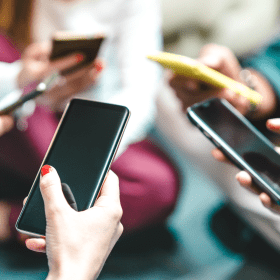How Sexual Violence Affects Mental Health in College Students

College is a crucial phase in a young adult’s life, characterized by significant developments in academic achievement, self-discovery, and exposure to diverse perspectives. However, it also comes with certain risks, such as the heightened likelihood of experiencing sexual violence and mental health concerns. In fact, according to the Rape, Abuse & Incest National Network (RAINN), 13 percent of college students experience sexual violence during their time on campus.
In this article, we delve into the topic of how sexual violence can worsen mental health issues and examine the various ways in which it can affect pre-existing mental health conditions. Additionally, we aim to offer practical advice and coping mechanisms for healing, along with a list of available resources for survivors and their supporters.
What is Sexual Violence?
Sexual violence is an umbrella of unwelcome and harmful acts, such as stalking, sexual assault, rape, sexual harassment, and intimate partner violence. While sexual violence is a broad concept that affects people of all backgrounds, some populations are more vulnerable than others, such as college students; the LGBTQ+ (lesbian, gay, bisexual, transgender, and queer or questioning) and BIPOC (Black, Indigenous, and People of Color) communities; and people with disabilities. It’s also a fact that sexual violence occurs most commonly between people who already know each other, such as intimate partner sexual violence.
The Link Between Sexual Violence and Mental Health
Sexual violence has a significant effect on survivors’ mental health due to its deeply personal and traumatic nature. Emotional regulation, self-worth, and memories are often the most impacted areas of one’s sense of self after a traumatic experience.
Symptoms of experiencing sexual trauma can look different for everyone, but some of the most common responses include
- shock
- flashbacks
- confusion
- sadness
- anger
- despair
All these responses are valid, but it’s important to remember that not everyone experiences trauma or responds to trauma the same way. In some cases, trauma can lead to the development or resurgence of mental health concerns such as Post-Traumatic Stress Disorder (PTSD), substance abuse, suicidality, and panic disorder.
How Sexual Violence Affects the Brain
One of the most well-documented reasons for these effects is that trauma has a profound impact on the prefrontal cortex and limbic system in the brain.
The prefrontal cortex
Function: The main control center for planning, decision making, attention, and concentration, making it particularly susceptible to changes throughout one’s life.
Effects: When responding to stress, neurotransmitters such as dopamine increase in the prefrontal cortex, leading to heightened hypervigilance, paranoia, pessimism, rumination, and declines in attention and academic performance.
The limbic system
Function: The hub of memory and learning, where emotional experiences tend to create long-lasting effects on one’s memories and emotional regulation abilities.
Effects: When trauma occurs, it can signal the brain to remain on high alert, causing a cortisol flood into the limbic system. This chronic release and presence of cortisol has been linked to cell death in the hippocampus (a significant part of the limbic system related to memory), which causes the limbic system to have an increased startle response, decreased ability to read social cues, decreased ability to learn new things, and increased susceptibility to flashbacks and visions.
Studies have found that early disclosure and/or intervention in sexual violence cases has reduced symptoms due to the brain’s plasticity and ability to take in new coping skills, some of which will be discussed below.
Healing Trauma: Mental Wellness Techniques for College Students
Developing coping skills is an important tactic to help decrease symptoms of panic, depression, anxiety, and crises. While campus resources are extremely valuable and accessible, it can also be helpful to learn skills to have at the ready when you need to self-regulate or feel safe.
While this isn’t a comprehensive list, these are some excellent coping strategies for sexual violence and trauma if you or someone you know has experienced sexual violence:
Trauma-Informed Yoga and Meditation
Trauma-informed yoga and meditation are great options to aid in the healing process for individuals affected by trauma. These practices focus on creating a safe, supportive, and non-judgmental environment, allowing participants to reconnect with their bodies and minds gently and respectfully.
St. John’s University offers weekly trauma-informed yoga sessions every semester. You can stay updated on the schedule and other relevant information by following @soar_sju on Instagram.
Mindful Practices
Engaging in mindful activities can be a great way to reduce stress and improve overall well-being. Some examples of mindful activities include practicing hobbies or skills that bring comfort, such as knitting, crocheting, drawing, walking, doing a puzzle, or birdwatching. Individuals can cultivate a sense of calm and relaxation by being present in the moment and fully engaged in these activities.
Journaling
Writing about things related or unrelated to a traumatic event can be helpful for reflection and even distraction, if necessary. Studies have shown that writing about trauma can lead to a reduction in the intensity of memories. Even making random lists, writing affirmations, or crafting fictional stories have all been linked with increased mindfulness.
A Healthy Relationship with Social Media
Although connecting with others is a valuable way to cope and can have numerous benefits, it is crucial to be cautious when using social media. The continuous stream of news, opinions, and images can often become overwhelming and contribute to negative mental states such as comparison, jealousy, isolation, and anxiety.
Bonus Tip: Focus on Things You Can Control
Even when everything seems confusing, it’s important to remember that you still have control over certain things. Maintaining a healthy sleep cycle, proper eating habits, and intentional physical activity is crucial to increasing your sense of power and autonomy. This can help you stay motivated and improve your overall well-being.
Mental Wellness Support Resources at St. John’s University
The St. John’s University Office of Sexual Violence Outreach, Awareness, and Response is dedicated to providing resources to survivors of sexual violence and promoting wellness and community. If you have experienced sexual violence and feel any of the symptoms or behaviors mentioned above, it could be beneficial to speak to a trusted, confidential mental health professional. The benefits include validation, positive coping skills, a sense of security, and autonomy.
Here’s a list of free and confidential on-campus resources if you or someone you know has experienced sexual violence
- Campus Support Adviser: 718-990-8484 or csa@stjohns.edu
- Center for Counseling and Consultation
- After Hours Mental Helpline
- Additional Education Resources offered by the SOAR (Sexual Violence Outreach, Awareness, and Response) Office.
If you or someone you know has been impacted by sexual violence and want to report it, contact the Title IX Office at titleix@stjohns.edu or 718-990-2660. If you need more information on how to report sexual assault, please visit this webpage.
It’s important to remember that if you or someone you know is a survivor of sexual violence, you’re not alone, and there are people at St. John’s who are here to help. If you’re looking for information or a deeper understanding of consent and/or bystander intervention skills, the SOAR office facilitates training on consent and bystander intervention and provides programming and events every semester for students to attend and learn about how to make the campus a safer place.






